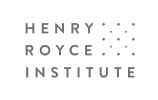© Pint of Science, 2025. All rights reserved.
Join us for our launch event - a little 'sip of science' - ahead of the main Manchester Pint of Science Festival taking place from the 22nd - 24th May 2023.
You will hear fascinating flash talks across multiple themes featuring some of Manchester's leading thinkers and researchers.
Complimentary welcome drinks will be served until 5:45pm.
Please note: Alcoholic drink options will be served - please be prepared to show your Photographic ID to prove your age, if asked.
Here's a taster of some of the subjects we'll be hearing about:
You will hear fascinating flash talks across multiple themes featuring some of Manchester's leading thinkers and researchers.
Complimentary welcome drinks will be served until 5:45pm.
Please note: Alcoholic drink options will be served - please be prepared to show your Photographic ID to prove your age, if asked.
Here's a taster of some of the subjects we'll be hearing about:
Sip of Science: Atoms to Galaxies
Liam Smith, PhD Researcher: The Chemistry Behind Electricity.
Electricity is generated from many different sources, one of which is nuclear reactors. The chemistry behind these reactors is vital and when exploited, can help towards keeping our lights on for longer.
Daniel Scotson, PhD Researcher: It’s rocket science
Get an insight into the science behind ceramic coatings for demanding high-temperature environments.
Electricity is generated from many different sources, one of which is nuclear reactors. The chemistry behind these reactors is vital and when exploited, can help towards keeping our lights on for longer.
Daniel Scotson, PhD Researcher: It’s rocket science
Get an insight into the science behind ceramic coatings for demanding high-temperature environments.
Sip of Science: Beautiful Minds
Dr Leone Buckle, Lecturer in Psychology: Now you see me, now you don’t - children's language learning
Children learn language from an adult’s speech during video and audio and audio-only online interactions.
Phoebe Harding-Walker, PhD Researcher: I am different, not less - let's talk Autism Theory
Current explanations of Autism have dominated the literature for around the last 50 years. This talk will explore and evaluate these explanations, will question why they are still so influential, and will introduce some new, and exciting, ideas on the horizon.
Children learn language from an adult’s speech during video and audio and audio-only online interactions.
Phoebe Harding-Walker, PhD Researcher: I am different, not less - let's talk Autism Theory
Current explanations of Autism have dominated the literature for around the last 50 years. This talk will explore and evaluate these explanations, will question why they are still so influential, and will introduce some new, and exciting, ideas on the horizon.
Sip of Science: Our Body
Erin-Claire Pallott, PhD researcher: Snot Just Slime – Introducing the Mucus Barrier
Far more than an annoyance that blocks your nose during a cold, your mucus forms a vital defence system against infectious threats from the outside world.
Josh Mouland, Research Associate: Circadian Rhythms - our biological timekeepers
Investigating the interplay of light in a shift work environment. Here Josh will take you on a journey into our biological timekeepers.
Far more than an annoyance that blocks your nose during a cold, your mucus forms a vital defence system against infectious threats from the outside world.
Josh Mouland, Research Associate: Circadian Rhythms - our biological timekeepers
Investigating the interplay of light in a shift work environment. Here Josh will take you on a journey into our biological timekeepers.
Sip of Science: Our Society
Nicholas Overton, Research Associate: Ethical relationships with multispecies materials
To do archaeology is to think about how people in the past thought about materials; in this talk, we will consider how human relationships with animals in the past affected how they used and treated animal materials, and consider how we might use knowledge of the past to shape our own futures.
John Piprani, Archaeology Technician: Thinking about thinking about Kimberley Points
Exploring different understandings of materials, and implications for our futures.
To do archaeology is to think about how people in the past thought about materials; in this talk, we will consider how human relationships with animals in the past affected how they used and treated animal materials, and consider how we might use knowledge of the past to shape our own futures.
John Piprani, Archaeology Technician: Thinking about thinking about Kimberley Points
Exploring different understandings of materials, and implications for our futures.
Sip of Science: Planet Earth
Joe Ravetz, Future Cities Lead at The University of Manchester: There is no Planet B
I would like to share some research in progress in cartoon form on the ‘big-bad-world’ of climate policy, and the possibility of a ‘collective climate intelligence’.
Dr Chika Watanabe, Senior Lecturer in Social Anthropology, The University of Manchester: Can (should) we make disasters fun?
Disasters from earthquakes and climate change are no laughing matter. But how are disaster preparedness actors have been using playful methods to teach children and their families skills to survive ‘natural’ disasters.
I would like to share some research in progress in cartoon form on the ‘big-bad-world’ of climate policy, and the possibility of a ‘collective climate intelligence’.
Dr Chika Watanabe, Senior Lecturer in Social Anthropology, The University of Manchester: Can (should) we make disasters fun?
Disasters from earthquakes and climate change are no laughing matter. But how are disaster preparedness actors have been using playful methods to teach children and their families skills to survive ‘natural’ disasters.
Sip of Science: Tech Me Out
Beatriz Mingo, Presidential Fellow (academic): Can cars be made of light alloys?
In this talk, we will explore how smart coatings can help us expand the lifetime of lightweight components and ultimately improve the energy efficiency of vehicles.
Callum Andrew, PhD researcher: How to develop cleaner, safer nuclear energy - nuclear fuel cladding
Improving the longevity of nuclear fuel cladding increases energy efficiency and reduces the amount of nuclear waste, but how can we do this?
In this talk, we will explore how smart coatings can help us expand the lifetime of lightweight components and ultimately improve the energy efficiency of vehicles.
Callum Andrew, PhD researcher: How to develop cleaner, safer nuclear energy - nuclear fuel cladding
Improving the longevity of nuclear fuel cladding increases energy efficiency and reduces the amount of nuclear waste, but how can we do this?
Map data © OpenStreetMap contributors.

